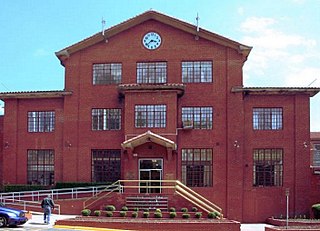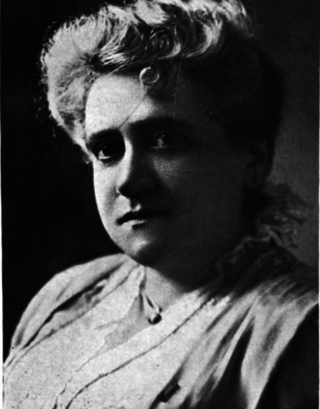
Juliette Gordon Low was the American founder of Girl Scouts of the USA. Inspired by the work of Robert Baden-Powell, founder of Scout Movement, she joined the Girl Guide movement in England, forming her own group of Girl Guides there in 1911.

Alice Lee Roosevelt Longworth was an American writer and socialite. She was the eldest child of U.S. president Theodore Roosevelt and his only child with his first wife, Alice Hathaway Lee Roosevelt. Longworth led an unconventional and controversial life. Her marriage to Representative Nicholas Longworth III, a Republican Party leader and the 38th speaker of the U.S. House of Representatives, was shaky, and her only child, Paulina, was from her affair with Senator William Borah.

Alice Hathaway Roosevelt was an American socialite and the first wife of President Theodore Roosevelt. Two days after giving birth to their only child, she died from undiagnosed Bright's disease.

Percy V. Pennybacker Jr. (1895–1963) was a Texas civil engineer who pioneered the technology of welded structures, particularly for bridges.

Helen Catherine Hardwicke is an American film director, production designer, and screenwriter. Her directorial work includes Thirteen (2003), which she co-wrote with Nikki Reed, the film's co-star, Lords of Dogtown (2005), The Nativity Story (2006), Twilight (2008), Red Riding Hood (2011), Plush (2013), Miss You Already (2015), Miss Bala (2019), and Prisoner's Daughter (2022).

Texas State Penitentiary at Huntsville or Huntsville Unit (HV), nicknamed "Walls Unit", is a Texas state prison located in Huntsville, Texas, United States. The approximately 54.36-acre (22.00 ha) facility, near downtown Huntsville, is operated by the Correctional Institutions Division of the Texas Department of Criminal Justice. The facility, the oldest Texas state prison, opened in 1849.
The following is a timeline of the history of the city of Austin, Texas, USA.
Pennybacker may refer to:

The Texas Federation of Women's Clubs (TFWC) is a non-profit women's organization in Texas which was founded in 1897. The purpose of the group is to create a central organization for women's clubs and their members in Texas relating to education, the environment, home and civic life, the arts and Texas history. Seventy-percent of public libraries in Texas were created through the work of the members and clubs of the TFWC.

Anna Goodman Hertzberg was an American clubwoman who served as the co-founder of an all-women's chamber music society, the first women's music association in Texas.

Virginia Claypool Meredith was an American farmer and livestock breeder, a writer and lecturer on the topics of agriculture and home economics, and an active clubwoman and a leader of women's organizations. Dubbed "Queen of American Agriculture" by the citizens of Mississippi in the 1890s, Meredith was also a pioneer in agricultural education. Between 1897 and 1903 she established the home economics programs at the University of Minnesota and served as the program's first professor. From 1921 to 1936 she served as the first woman appointed a Purdue University trustee. Meredith chose an unusual vocation for women of her time, successfully managing the day-to-day operations of her family's Indiana farm from 1882 until 1915. In addition to her agricultural-related work, Meredith was appointed to the Women's Board of the 1893 World's Columbian Exposition, serving as vice chair of the Women's Board and chair of its awards committee. She was also elected president of the Indiana Union of Literary Clubs, a founder of the Indiana Federation of Women's Clubs, and the first president of the Indiana Home Economics Association, founded in 1913.

Joanna Snowden Porter was an American clubwoman based in Chicago; she was founder and president of the Northwestern Federation of Colored Women's Clubs.

Florence Spencer Duryea was an American philanthropist and clubwoman, national secretary of Women's Organizations for Near East Relief, based in New York City.

Effie Adelaide Payne Austin a professional musician and clubwoman.

Georgina Petrina Geertsen Marriott was a Utah teacher and clubwoman.

Emma S. Connor Ransom was an American educator and clubwoman, active in the African Methodist Episcopal Church (AME) and the YWCA.

Nannie Webb Curtis was an American lecturer and temperance activist, widely-known as a clubwoman. She wrote essays on the topic and edited a magazine. She served as National vice-president of Woman's Christian Temperance Union (WCTU), sat on the National Executive Committee, and was also on the Official Board of the National WCTU, the lawmaking body of organization. Her father having been a Methoidist minister, she made her living lecturing as a pulpit orator on the topics of prohibition and woman suffrage on behalf of the National WCTU, Chautauqua, and the lyceum circuits. Frequently characterized as being "bigger than her state", Curtis was a patriot and a speaker of national fame.
Clara Rankin Coblentz was an American temperance reformer and clubwoman. Coblentz held leadership positions in a number of organizations including president of the Non-Partisan National Women's Christian Temperance Union, the Presbyterian Foreign Missionary Society (Clarion), and the Home and Foreign Missionary Society (Clarion).


















